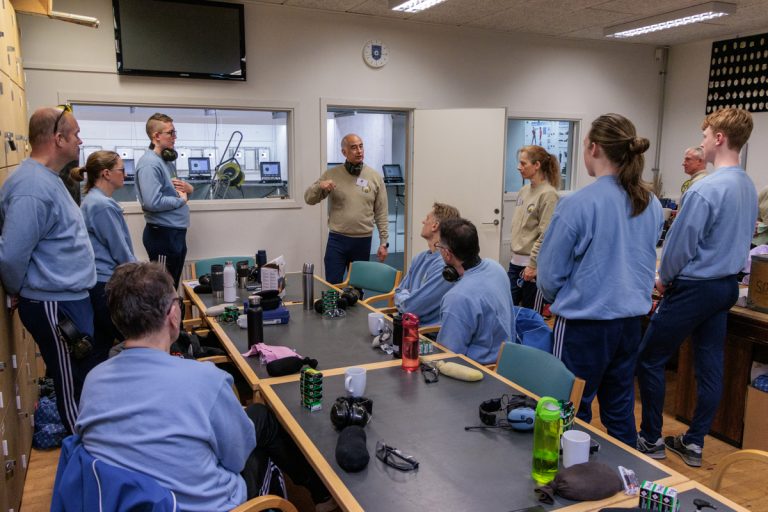
POMW IIa, which is the first part of the POMW II course, has recently been completed, and it has given all new shooters a good introduction to shooting with .22 caliber, while at the same time getting old shooters going again. We started off with a carefully controlled review and execution of the safety procedures and weapon handling, which was good, especially for me, who as an old shooter might have picked up some bad safety habits since I was on the course myself.
With that, and some words from Kimu Sensei about the importance of humility and willingness to learn and change, the stage was set for the first day of training. Today's training consisted of two rounds of shooting, one that was 100% controlled by Kimu Sensei and one that was 50% self-guided. We used a sock as a support on the wrist, which helped a lot with troubleshooting and allowed us to train more focused on the five focus points (correct sights, correct grip, correct trigger, correct recoil control and rear sight, and correct breathing and setting) without having to worry about commuting the weapon.
Personally, I really liked training this way as I can feel that I get the process done better and I see results when I can keep my focus and do the process right. On the other hand, there are also no excuses when the shot does not hit, and in that case the fault can always be found in one of the five focus points, whether it was a trigger fault or a problem with the aiming devices.
I haven't been able to find the same learning process when we've trained standing before, and it's probably because I have a habit of blaming my inaccuracy on commuting, which I couldn't do with the sock. So even as an old shooter, this completely "beginner-friendly" training has been an eye-opener for me to take this concept of humility more seriously. I discovered this halfway through the second round of shooting – the one that was the 50% standalone – and I remember getting more and more frustrated that I couldn't hit until I finally gave up.
By giving up I mean I stopped focusing on trying to hit well, I stopped chasing points and focused on the process and on feeling the five focal points. And just as I did, my shooting turned. It was like night and day. I ended up putting six overlapping shots in the 9 straight before it dawned on me how good it was going and my ego came back and my shooting started to spread again.
In the week between the two trainings, I made sure to train a lot. The success of the first training had really inspired me, and I was very concerned about recreating exactly the technique that had worked so well for me. Looking back on it now, I realize that I had completely forgotten what really made me hit, which was my shift in attitude. In my dry training, I only got to focus on all the less practical things, like the trigger and the sights, but not once did it occur to me that I should take it easy and not shoot for the sake of my ego.
When, after a week, we got together again for one more round of shooting, I was all set to go out and shoot 300 points. So it's probably not a surprise when I say that I started out exactly the same as last time with not hitting anything and getting frustrated with how I shot. Looking back on it now, it's a mystery to me how I didn't put two and two together. I ended up going all the rounds without changing my attitude. Here in the second practice we even drove a higher pace, so you would think that the extra laps would give me more time to regain humility, but it didn't happen.
We ended the day by riding a single lap standing up, without the sock for support, and I have a lot to improve on next time. I was feeling very sorry for myself because yesterday's KataFIT and arm stretches had taken a toll on me. That, combined with the fact that we had been at it for a long time, meant that I did not want to focus on the process, and my chances of regaining the setting were made very slim. It was obviously an annoying way to finish, and although I did my best to hide it, I'm sure my disappointment with today's results was on full display.
However, I had still tried to do my best, so that means that now I can do nothing but learn from it. And what I'm going to learn is exactly what we were told on day 1 before we even saw the guns, and it's just taken me a long time to understand.
It is lessons like this that make POMW an important tool. When we stand and train in the dojo, we don't get any feedback, unless you get direct corrections from the instructor. When we are out training POMW, you get feedback straight away, and it is as direct and factual as it can possibly be; did you hit or didn't you hit. There you are very clearly "rewarded" for doing something right, but also clearly "punished" for doing it wrong.
Therefore, there is nothing to hide behind in the same way as in karate, where any idiot can put on a black belt and call himself invincible. Out on the range, you can lie as crazy as you want, but at the end of the day, the only thing that matters is what your target says. There is nothing to hide behind there. That's why it's also good for training - especially for stubborn people like me, who want to come in and show how good and cool they are, but who, when it comes down to it, can't produce the results. It puts some facts on the table that are not so clear in other contexts, and it forces one to be objective.
As an old shooter with my greater experience, I should at least keep up with the new shooters, but the targets are dead honest, and you can't run away from the result. It is up to me now to drop my "I know best" and my "300 point" mindset and just take it one shot at a time. I must also transfer this to my karate, because the setting must be the same in both parts.
I've been given the gift of being presented with a big mistake I'm making on a golden platter, and then I just have to accept it. Because the weapon has no influence on who I am. I am the same person whether I am standing in the dojo or on the shooting range. Therefore, the weapon shouldn't make any difference to how I train and how good I am. I control the weapon and I make the weapon what it is, not the other way around.
It's my attitude that controls how well I shoot and how I do karate, and they're basically two sides of the same coin. They are both exclusively about me. Towards POMW IIb, I will continue to train my technique with dry training, but I will now also focus to a greater extent on not being controlled by my emotions, and keep a humble and learning mindset regardless of how the day unfolds.















